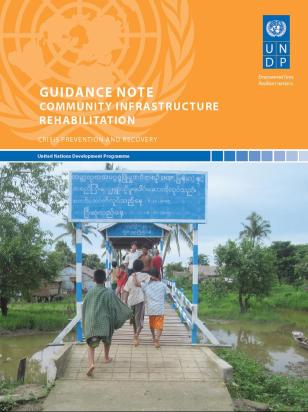Signature Product: Guidance Note on Community Infrastructure Rehabilitation

English
DownloadSignature Product: Guidance Note on Community Infrastructure Rehabilitation
November 23, 2015
Focussing on urgent post-crisis assistance, this guidance note provides practical advice to United Nations Development Programme (UNDP) Country Offices (COs) on how to plan, design and implement a short-term project that swiftly links governments and communities in the assessment, repair and reconstruction of essential community infrastructure such as local roads, bridges, irrigation canals, schools, health centers and markets.
When governments and communities are supported by well-designed and timely interventions, both nations and communities are assisted to ‘build back better.’ The UNDP post-crisis approach aims to build capacities within national
and local institutions and facilitate partnerships between government, civil society, the private sector and local communities. This enables local social, institutional, economic and physical assets to be strengthened and made more
disaster-resilient in the future.
To help countries and communities meet these challenges, the UNDP Bureau for Crisis Prevention and Recovery (BCPR) has developed a range of guidance notes to help COs develop and implement recovery activities rapidly in the
immediate aftermath of a crisis. Each guidance note focuses on a UNDP ‘signature product’, or niche area of programming, in which UNDP has the mandate, comparative advantage, competencies and skills in place to be able to rapidly design and implement a project of assistance to support crisis-affected governments and communities. The guidance notes in the ‘signature product’ series are principally intended as an internal resource that will strengthen and accelerate UNDP’s programmatic response in crisis and post-crisis settings. They are chiefly intended to inform ‘post-disaster’ planning and implementation. However, a number of the case studies that fed into their formulation derived their experience from post-conflict settings. Therefore, they may also be adapted for use in post-conflict settings or within country environments situated at the post-conflict/post disaster nexus.
This guidance note forms one of six practically oriented documents. Others in the series include ‘Emergency Employment and Enterprise Recovery’, Debris Management’, ‘Restoration of Local Governance Functions’, ‘National
Recovery Planning and Coordination’ and ‘Aid Management’. These notes can be used as tools to guide the development of individual projects targeted towards specific needs, and/or provide a basis for the design of a more
integrated and comprehensive programme of early recovery measures.

 Locations
Locations